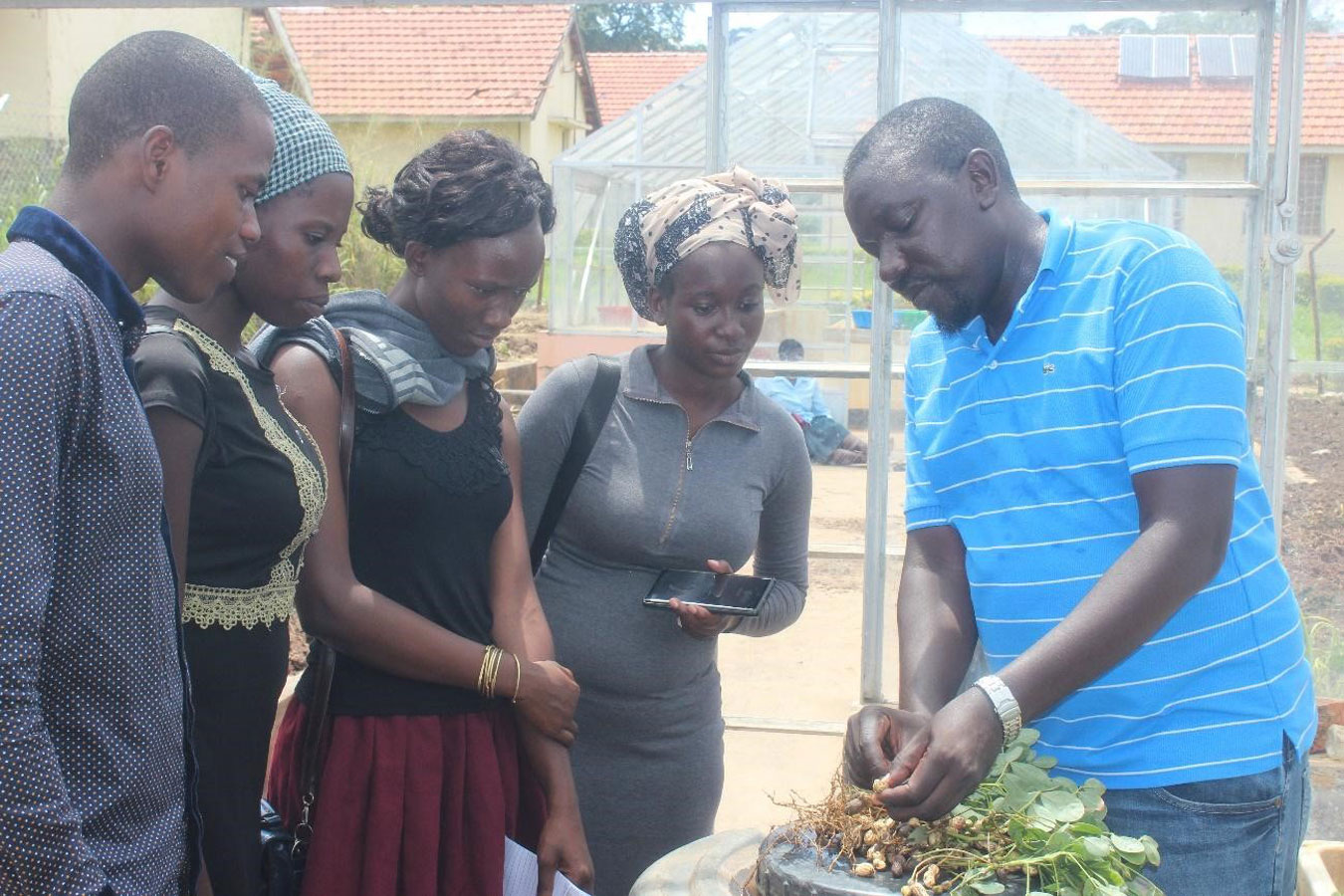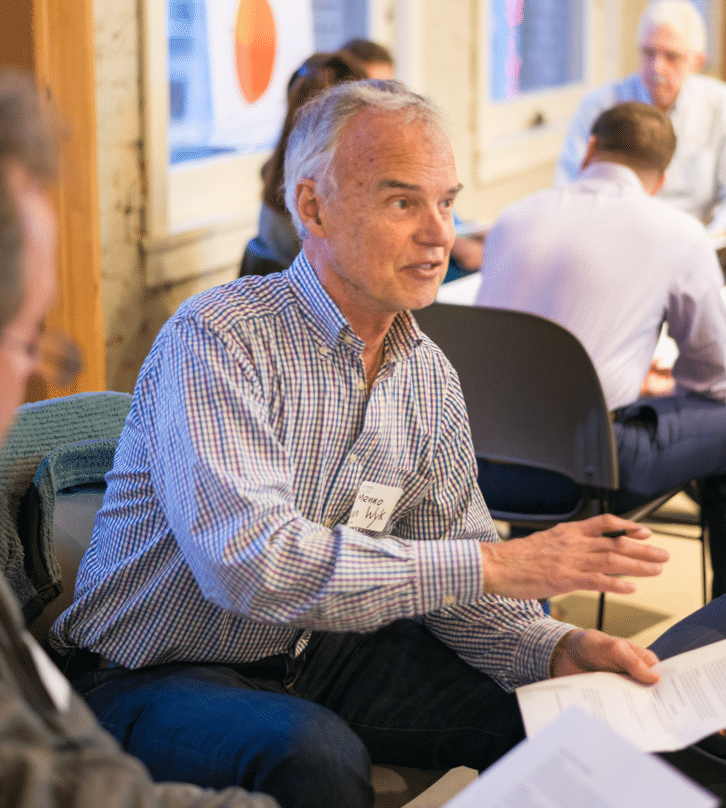Uganda’s groundnut farms face risks from climate change but their number one threat is the groundnut rosette virus, according to Dr. David Kalule Okello. Dr. Okello is a busy man. He has led Uganda’s groundnut research program at the Ministry of Agriculture’s National Agricultural Research Organization (NARO) for over 17 years. He’s responsible for breeding groundnuts, maintaining local and commercial cultivars, collaborating with colleagues at Cornell University and the University of Georgia, and training farmers and graduate students–16 graduated to date and 7 in training. “I have a strong passion for capacity building, for both the farmers and the students,” Okello explained proudly in a recent interview with Grow Further.
He also likes zombie movies.
Fighting a “zombie” virus
Groundnut rosette disease spreads through insect vectors and is found throughout sub-Saharan Africa. The virus can devastate entire crops and ruin smallholder peanut farmers, so Okello has his eyes set on eradicating this scourge. Patience and careful selective breeding are required to defeat this dangerous ailment, he said. To help us understand, he chose to paraphrase a line from the Hollywood box office hit “World War Z”.
“Mother nature is very cruel, but it’s just like a serial killer, always looking to get caught. So, it keeps leaving trails,” Okello said. “If you look very carefully you can actually find the recklessness of mother nature. So even though you find diseases where you think that everything has gone down, if you look carefully, one or two [genetic] lines are showing a level of resistance.”
“Mother nature is very cruel, but it’s just like a serial killer, always looking to get caught.”
In the movie, Brad Pitt’s character turns the tide on a raging zombie apocalypse by noticing how the virus causing it avoids seemingly sick individuals; illness itself revealed a way to prevent the end of the world. It might be the same for the groundnut rosette virus, Okello explained—thus, his focus on looking for resistant traits in even infected plants, because although you may think a groundnut plant has completely succumbed to the disease, a closer look at the molecular level could reveal hidden traits providing clues toward eventually defeating the groundnut rosette virus and perhaps saving smallholder farmers’ livelihoods. “I look for resistance within the plant itself now,” he said. He believes he’s on the cusp of developing a groundnut variety resistant to that particular virus and a host of other devastating pests and diseases. “We already have the genomic sequence for resistance,” he told us. “We\’re developing molecular markers. If we are successful, with a year or two we should have a marker-assisted platform.”
As in the case of Brad Pitt’s zombie apocalypse, Okello says failure is not an option. “If a new variety doesn’t have resistance to that pest or disease it can never survive anywhere,” he said.
Building a better peanut
But even if he should succeed, that won’t be the end of his work. Okello says he’s also busy identifying traits in groundnuts that will help smallholder peanut farms in Uganda become more resilient to increasingly erratic weather and unreliable rainfall. That means breeding peanut plants that mature earlier or later in the season, to help farmers hedge against an increasingly uncertain climate. “We have to come up with resistance to pests, diseases, and tolerance to drought…what we call now climate-smart,” he said. He senses that traits found in wild groundnut plants can lend a hand. Wild groundnuts have good genes, he explained, and they\’ve evolved to handle some of the harshest conditions thrown at them. “Through science, we are now able to get such [wild] genes and bring them back into the groundnut,” Okello said.
“If a new variety doesn’t have resistance to that pest or disease it can never survive anywhere.”
Dr. Okello is also enthusiastic about gender mainstreaming, ensuring there are equal opportunities for both women and men smallholder groundnut farmers. Science holds the key for greater gender equity, too, he insisted. Okello explained how he’s working on developing groundnut varieties that do well in marginal soils because it is often Uganda’s women farmers who are forced to till and farm in these less-than-optimal soil conditions. It’s a win-win proposition as he gains further inspiration from the women he works with at the groundnut fields. For instance, a key difference he’s noticed between female and male peanut farmers is that “their selection criteria are different,” Okello noted. “Women look for nutrition, nutritional traits, whereas the men look more for the market traits.” Thus, Okello’s research into cultivating more nutritious groundnut varieties rich in iron and zinc—a process known as biofortification—is very much in-step with his gender mainstreaming philosophy.
The worldwide COVID-19 pandemic has slowed Dr. Okello down, but it hasn’t stopped him or Uganda’s groundnut research. Each day brings new threats and challenges, and new ways to outsmart them. The key ingredient is money and resources; luckily, Okello also wears the hat of chief fundraiser at NARO’s peanut improvement project. He said he’s always seeking out new financial resources to further advance his work helping smallholder groundnut farmers by developing disease-resistant and climate-resilient varieties for both primary consumption and industrial use. His country is counting on him. Among the legumes, groundnuts are second only to the common beans in terms of Uganda cooking, cuisine, and nutrition, Dr. Okello said. “We eat lots of groundnuts,” he noted. “It forms the culture of people here.”
— Grow Further
Photography credit: Dr. Okello directing undergraduate students on groundnut improvements. David Kalule Okello, Ministry of Agriculture, Uganda.




